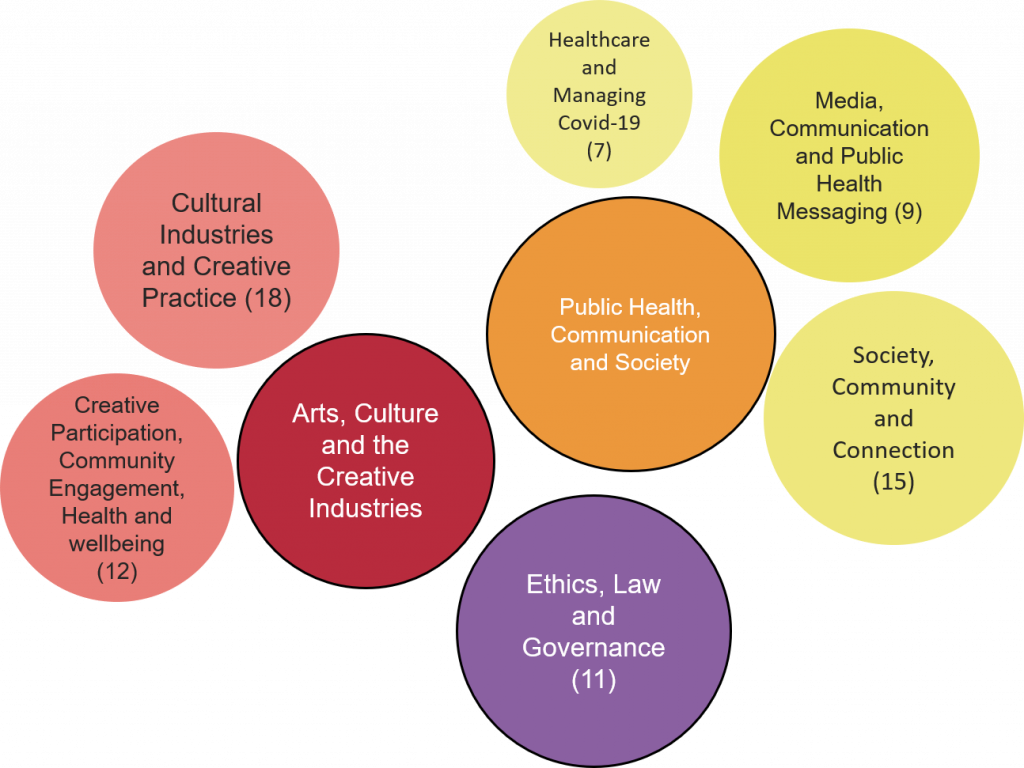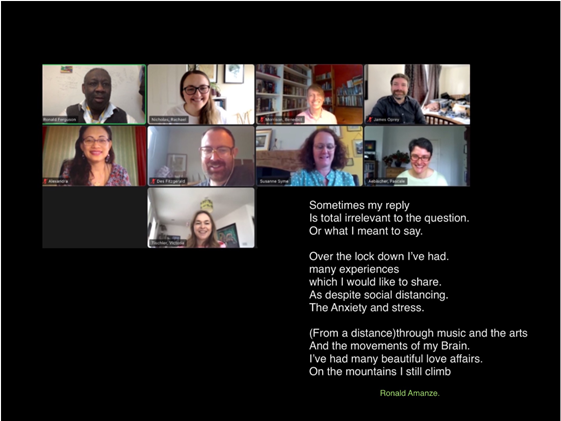We are now approaching three months of working on the Pandemic and Beyond project; our activities started at breakneck speed, and our work of coordinating, connecting and amplifying Arts and Humanities Covid-19 research is well underway. This blog post provides a brief overview of what we have been doing and looks forward to our plans for the next 21 months.
Mapping
We began our work by reaching out to all the lead researchers working on Covid-19 research funded by AHRC to gather more information about their projects. We’ve been asking them to tell us more about what their research is about, who they’re working with, and how they think their research is going to make a difference. This information has helped us identify five clusters (and three larger research groups) which are pictured below. These groups contain projects with similar aims, research themes and methodologies, allowing us to focus our coordination efforts. Further in-depth mapping of the projects is underway in the form of a thematic analysis of project proposals, which will enable us to produce further insights into the group of projects.

Connecting and Coordinating
We are now using these clusters to bring researchers together in workshops where they can meet formally at first and then ever more informally to compare notes, explore how they might be able to learn from one another, plan how best to communicate their work together, and share resources such as access to partner organisations. Three of the online workshops have now taken place, with two more ahead of us. The workshops have already begun to facilitate new connections and provided space for knowledge exchange about impact and communications strategies.
As well as being an opportunity for researchers to connect with each other, the workshops were an invaluable opportunity for the Pandemic and Beyond team to learn more about the specific issues facing researchers. Our approach is iterative one and aims to be responsive to the needs to researchers and to the impact of their projects. The workshops also provided the opportunity to hear more about the key stories that researchers feel need to be communicated about their research, whether that be the way that arts and cultural organisations have stepped in to provide community support during the pandemic, the impact that creative activity has on mental health and wellbeing, or the importance of recording and communicating lived experience.
Responding to what researchers have told us in these workshops, we are currently planning two further events focused firstly on policy and engaging with policy makers, and secondly on communications strategies.
As well as seeking input from the projects themselves, we are supported by a Lived Experience Panel and an Advisory Board. Our Lived Experience Panel is comprised of a group of individuals who have, both in their working lives and their private lives, been particularly affected by Covid-19 and who are helping us stay grounded and co-create a meaningful communications campaign. In our first meeting, panel members gave us their accounts of how they have battled with the impacts of Covid-19 on the people they work with and care for, and how they themselves have found ways of creating art and improve lives in the midst of trauma and isolation. Panel member Ronald Amanze has kindly given us permission to share the poem he wrote after our first meeting, which you can see below.
Our Advisory Board is comprised of a group of project leads and other experts with specific connections and experience of working with policymakers, the NHS, and with the government and parliament. This group is helping us develop a media and communications strategy that is also able to effectively connect with policymakers and promote the Arts and Humanities in the strongest way possible.

Amplifying
The work of amplifying the extraordinary work being undertaken by Arts and Humanities researchers in relation to Covid-19 has also started. As well as launching our website, our Twitter feed has been actively sharing and promoting events and findings from the projects. Our website will continue to grow with further information about the projects and with contributions to our blog.
We have also launched our podcast series. Each episode focuses on a specific Covid-19 project and includes input from those directly involved in or impacted by the research. The first two episodes explore digital theatre and the link between participation in the arts and mental health respectively, with future episodes on human rights in care homes and on social media during the pandemic to come.
While our podcast showcases individual projects, we are beginning to plan three short films, directed by filmmaker and Pandemic and Beyond team member Benedict Morrison, which will draw projects together to focus on specific stories or ‘narratives’ that this body of research tells about the pandemic, and the role of Arts and Humanities research in understanding those stories. These narratives cut across the clusters above, drilling down into the fundamental questions and challenges that Arts and Humanities researchers are grappling with, in turn highlighting the impact that this research has had on individuals, communities, organisations and society.
Next steps
We are very much looking forward to continuing to work with such an important group of projects and to maximising the impact of that research. Over the coming months we will be hosting further workshops, bringing you more blog posts and podcasts, continuing our analysis of the projects, and will be further developing our communications strategy. Do follow us on Twitter for updates!
If you would like to read more about the projects, please see our project pages.
If you’d like to contact us please email pandemicandbeyond@exeter.ac.uk.



